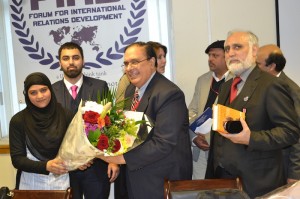 ‘There is no dearth of talent amongst Pakistan and Muslim countries should increase their mutual co-operation in the field of scientific research. Research and development and progress in knowledge economy are keys to the economic progress of a country.’ These thoughts were expressed by Dr. Atta Ur Rehman, former Chairman of the Higher Education Commission of Pakistan, while addressing a symposium on ‘Pakistan and knowledge economy’ at FIRD Dialogue Forum at Forum for International Relations Development. Dr. Rehman claimed that education and scientific development could play a key role in ending poverty in developing countries.
‘There is no dearth of talent amongst Pakistan and Muslim countries should increase their mutual co-operation in the field of scientific research. Research and development and progress in knowledge economy are keys to the economic progress of a country.’ These thoughts were expressed by Dr. Atta Ur Rehman, former Chairman of the Higher Education Commission of Pakistan, while addressing a symposium on ‘Pakistan and knowledge economy’ at FIRD Dialogue Forum at Forum for International Relations Development. Dr. Rehman claimed that education and scientific development could play a key role in ending poverty in developing countries.
Dr. Atta ur Rehman stated that during his stint as the Federal Minister Science & Technology and Chairman HEC spending on higher education in Pakistan increased by 6000 percent, while the Higher Education budget increased by 24000 percent. As a result, a large number of Ph.D. students came to fore. He also demonstrated that Pakistan’s scholars citation increased by1000 percent over last four years and that the country’s research output per million had surpassed India because of the higher education reforms brought in during his epoch. A total of 3944 PhD’s were produced from 2000-2009, while hardly 3200 completed their PhDs from 1947 to the year 2000.
Dr Atta ur Rehman maintained that Pakistan was stealing a march upon its neighbours in the field of research and that in 2006 India had felt a clear threat from Pakistan’s scientific progress. He impressed upon the government to enhance the education budget from 1.8 percent to 5 percent, claiming that whilst a large number of Pakistani students spent Rs. 100 billion per year in acquiring higher education in foreign countries. He expressed his frustration when his project was thrown into cold storage in 2008 under which German, French and Italian universities had agreed to open their campuses in Pakistan.
Toaha Qureshi MBE Chairman Forum for International Relations Development emphasised that innovation determined the progress of a country and knowledge was the key to innovation. He declared that Pakistan has to attract the brightest minds to work for the country by a step strategy, which also formed a key challenge as to how to attract the brightest students into higher education and research within the country as opposed to abroad.
Toaha Qureshi stressed on the United States’ to play its vital role role in the transition to a knowledge economy, by executing the memorandum which was signed between President Bush and President Musharraf in which trade and scientific agreements were signed for closer co-operation.
Arif Anis Malik, Programme Director Forum for International Relations Development and Philip Lingard senior fellow also spoke at the occasion. The symposium was attended by a large number of community and business leaders, students and researchers.
![[X] Close](http://www.fird.org.uk/wp-content/themes/fird/images/close.png)





